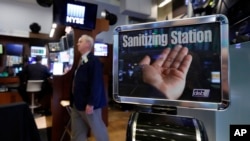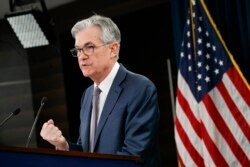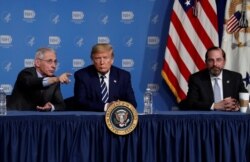Continued fears among investors about the economic impact of the coronavirus sent U.S. stock prices sharply lower on Tuesday — even after the Federal Reserve announced an emergency rate cut.
"We saw a risk to the outlook for the economy and chose to act," Fed Chairman Jerome Powell said in explaining the central bank's decision to chop a half of a percent off interest rates to a target range of 1.00 percent to 1.25 percent.
The Fed's decision, however, did not assuage traders or President Donald Trump.
After a brief spurt into positive territory, key stock market indexes again declined. The Dow Jones Industrial Average closed down 788 points, a drop of nearly 3 percent.
"We should be paying less. The Fed rate is too high," Trump said in a speech to the National Association of Counties legislative conference followed the central bank's action.
On Twitter, the president called for "more easing and cutting."
New York Governor Andrew Cuomo announced his state's second confirmed COVID-19 case on Tuesday. The 50-year-old man had not traveled to China or other countries at the nexus of the coronavirus outbreak.
Trump is pushing for quick development and deployment of a vaccine, which he discussed Monday with pharmaceutical company executives who came to the White House.
Deployment of such a vaccine is at least one year to a year-and-a-half away, Dr. Anthony Fauci, director of the National Institute of Allergy and Infectious Diseases, told U.S. senators on Tuesday.
At the senate hearing, the head of the U.S. Food and Drug Administration, Dr. Stephen Hahn, said the FDA has been working with a private company to get as many as 2,500 test kits out to laboratories by the end of the week.
New guidance was being issued by the Centers for Disease Control and Prevention to make it clear that any American can be tested with no restrictions "subject to doctor's orders," Vice President Mike Pence announced at an off-camera White House briefing Tuesday evening.
Health professionals across the country have complained about a lack of adequate testing and missteps by federal authorities, including botching an initial diagnostic test and restricting widespread screening.
"I am hearing from people who are sick, who want to get tested, and don't know where to go," said U.S. Senator Patty Murray, a Democrat from the state of Washington, the location of all nine domestic deaths from the disease.
Later in the day, Health and Human Services Secretary Alex Azar explained that a manufacturing issue with the test kits was rectified within the past week.
Azar spoke at a roundtable meeting with Trump at the National Institute of Health's Vaccine Research Center.
Pence was also supposed to attend that meeting. Trump said he told Pence to stay on Capitol Hill for the continuing discussions on supplemental funding — expected to total about $8.5 billion — for the government's response to the disease outbreak.
"We're going to be looking at the uninsured to see if we can help them out," said the president.
The costs of diagnostic tests for the coronavirus will be covered by insurance plans, as well as Medicare and Medicaid for the elderly and poor, administration officials confirmed Tuesday.
The top Democrat in the Senate, Chuck Schumer, told reporters that lawmakers were making good progress and he believes "we will have a bill on the president's desk by the end of this week."
Schumer added that a vaccine "should be cost-effective and not out of the reach of average folks."
The coronavirus has infected more than 90,000 people worldwide and killed more than 3,100.
VOA's Katherine Gypson contributed to this report.








